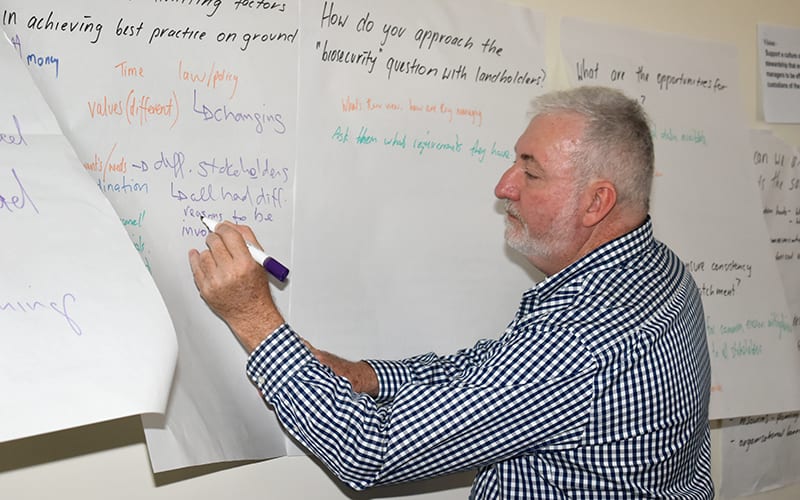Lindsay Mackie, Collinsville Depot WRC Works Supervisor contributes to the discussion during a workshop
Workshop facilitator David Donohue leads the discussion
Finding common ground: engaging with
non-grazing land managers
THE LDC team is engaging with non-grazing land managers to help them get involved with the project. Two forums were held in Eungella and Collinsville last month and those present overwhelming supported to work more closely with landholders in the BBB catchment.
Through a participatory process, the LDC project is engaging with non-grazing land managers to get involved with the project in ways that will support a culture of stewardship that enables all land managers (grazing and non-grazing) to be effective custodians of the land.
Two forums were held last month, in Eungella and Collinsville, to provide an opportunity for these land managers to come up with ideas on how they could work collaboratively in the BBB catchment.
Representatives from Ergon Energy, Powerlink, Glencore, Whitsunday Regional Council, and machinery operators attended the forums. Utility providers who were unable to attend but have expressed an interest to be part of the process, includes Sunwater, Aurizon, Collinsville Solar Farm.
Key ideas discussed at the forums:
- Establish a set of standards for common erosion mitigation techniques that apply to all stakeholders “because it helps us all” and “supports a culture of stewardship”
- Establish a monetary value on the “whole system”, that is a value per kilogram of soil, and on the BBB’s natural assets
- Plan on ground works with input from graziers
- Hold community education days (including field walks and workshops)
- Hold round tables with government and grazier representatives on legislation and policies that could impede on ground delivery of best practice on erosion and sediment control in the BBB catchment
- Develop a centralised communication hub for all land managers in the BBB to create awareness of stakeholders planned works and activities in the BBB
- Facilitate access to technical expertise and peer input
- Facilitate understanding of legislative requirements each stakeholder operates within
- Coordinate collaborative actions for on-ground works and joint activities to inform the BBB community about what each stakeholder does in the BBB
- Provide a safe place to bring up and respond to issues and concerns
Key actions from the forums:
- A survey has been developed and forwarded to the non-grazing land managers in the BBB to establish the level of engagement each organisation would like to take part.
- The LDC team is investigating how best to develop a communication hub to provide a platform for information exchange and shared learning.
- The LDC team is also investigating existing minimum standards of practice for erosion sediment control to identify opportunity to develop a whole of BBB catchment approach to manage erosion sediment control.
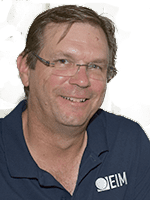
EIM Pipeline Supervisor – Northern
“It was a learning outcome for me. The meeting was interesting and allowed participants to find out who the other stakeholders were in the catchment and what the bigger picture visions are for the LDC project.
I have a good understanding now of where we fit in and what our role can be as one of the “other land managers” in the BBB.
Everyone appears to be interested in actually finding out what best practice is for the region and sharing the knowledge they have”
North Queensland Gas Pipeline
- A 391km onshore natural gas pipeline system, transporting gas from the Moranbah Gas Project in the Bowen Basin to power and industrial uses in Townsville. This pipeline goes through a number of properties located in the BBB catchment.
- Constructed and commissioned by Enertrade in 2004 with an expected life of 50 years.
- The pipeline is managed by EIM, an independent operator owned by AGL and Arrow.
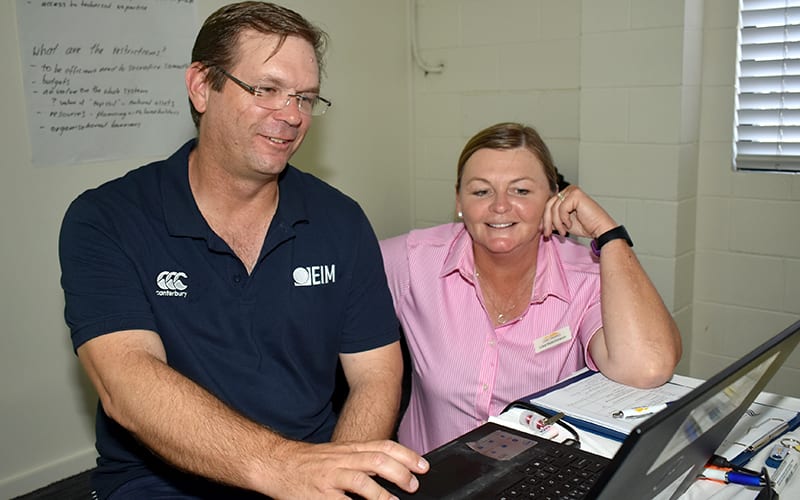
Anatol Stremouchiw, EIM Pipeline Supervisor – Northern with LDC’s Lisa Hutchinson at the workshop
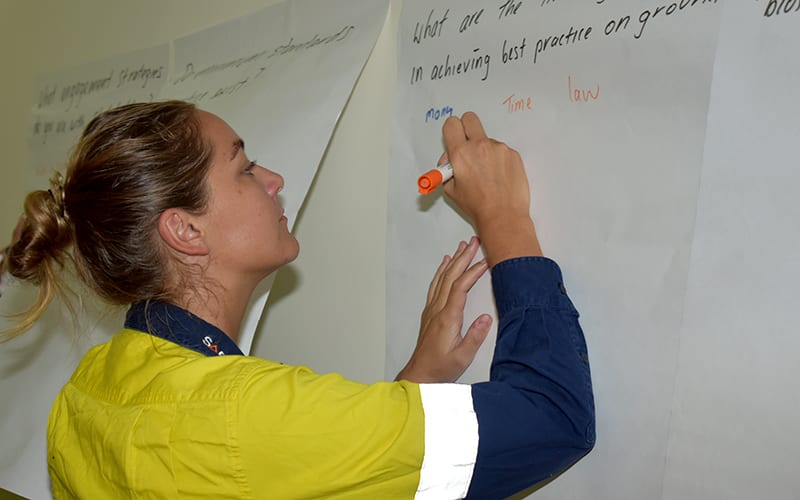
Jessica Szalinski, Glencore, at a workshop problem-solving session
More heads, more ideas
THE LDC team believes a participatory effort that involves representation of as many stakeholders in the BBB catchment as possible has a number of advantages:
- It puts more ideas on the table than would be the case if the development and implementation of the effort were confined to a small group.
- It includes varied perspectives from all sectors and the BBB community affected, therefore giving a clearer picture of the community context and potential pitfalls and assets.
- It gains buy-in and support for the effort from all stakeholders by making them an integral part of the development, planning, implementation, and evaluation of LDC project aims.
- It’s fair to everyone. All stakeholders can have a say in the development of an effort that may affect them.
- It saves the BBB community from being blindsided by concerns that it didn’t know about. If everyone has a seat at the table, concerns can be aired and resolved before they become stumbling blocks. Even if they can’t be resolved, they won’t come as surprises that derail the effort.
- It strengthens the community’s position. Having all stakeholders on board makes a huge difference in terms of political clout.
- It creates bridging social capital for the community. Social capital can cement relationships and strengthen community. Bridging social capital can create connections among diverse groups that might not otherwise interact.
- It increases the chances for the success of stakeholders effort. For all of the above reasons, identifying stakeholders and responding to their concerns makes it far more likely that effort will have both the community support it needs and the appropriate focus to be effective.
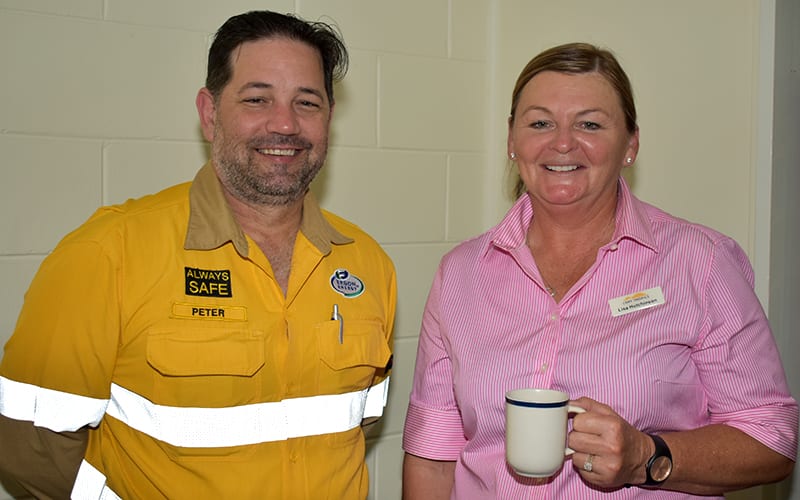
Ergon Team Leader Peter Gorrie with LDC Senior Project Officer Lisa Hutchinson
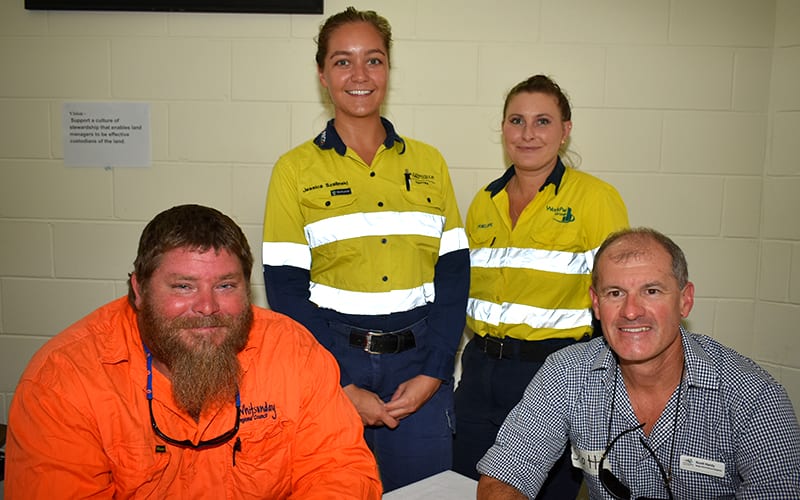
Jessica Szalinski, Glencore, (left) and Penelope Davis, Glencore, with (from left) Lindsay Mackie, WRC Works Supervisor Collinsville Depot and WRC Manager Natural Resources Management Scott Hardy


